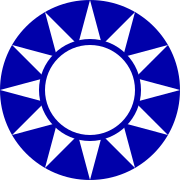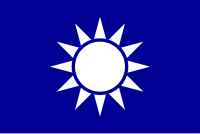
Back Kuomintang Afrikaans الكومينتانغ Arabic الكومينتانج ARZ Kuomintang AST Homindan Azerbaijani Гаміньдан Byelorussian Гоминдан Bulgarian Kuomintang Breton Kuomintang BS Гоминьдан BXR
Kuomintang of China 中國國民黨 Zhōngguó Guómíndǎng Chungkuo Kuomintang | |
|---|---|
 | |
| Abbreviation | KMT |
| Lider | Chairman Eric Chu Premier Sun Yat-sen (Eternal) Director-General Chiang Kai-shek (Eternal)[1] |
| Secretary-General | Lee Chien-lung |
| Namukna | 10 Oktobre 1919 |
| Preceded by |
|
| Headquarters | No. 232–234, Sec. 2, Bade Rd., Zhongshan District, Taipei City 104, Taiwan [2] |
| Newspaper |
|
| Think tank | National Policy Foundation |
| Youth wing | Kuomintang Youth League Three Principles of the People Youth League (1938–1947) |
| Education wing | Institute of Revolutionary Practice |
| Armed wing | National Revolutionary Army (1925–1947) |
| Paramilitary wing | Blue Shirts Society (1932–1938) |
| Membership (2020) | 345,971[3] |
| Ideology | |
| Political position | Centre-right[20][21][22]Plantilya:Cref Historical: Big tent[23][24] |
| National affiliation | Pan-Blue Coalition |
| Regional affiliation | Asia Pacific Democrat Union |
| International affiliation | |
| Colours | Blue |
| Legislative Yuan | 38 / 113 |
| Municipal mayors | 2 / 6 |
| Magistrates/mayors | 12 / 16 |
| Councillors | 394 / 912 |
| Township/city mayors | 83 / 204 |
| Party flag | |
 | |
| Website | |
| Official website | |
Plantilya:Cnote | |
| Kuomintang | |||||||||||||||||||||||||||||||||||||||||||
 "Kuomintang (Guómíndǎng)" in Traditional (top) and Simplified (bottom) Chinese characters | |||||||||||||||||||||||||||||||||||||||||||
| Pangaran na Intsik | |||||||||||||||||||||||||||||||||||||||||||
|---|---|---|---|---|---|---|---|---|---|---|---|---|---|---|---|---|---|---|---|---|---|---|---|---|---|---|---|---|---|---|---|---|---|---|---|---|---|---|---|---|---|---|---|
| Tradisyonal na Intsik | 中國國民黨 | ||||||||||||||||||||||||||||||||||||||||||
| Pinasimpling Intsik | 中国国民党 | ||||||||||||||||||||||||||||||||||||||||||
| Literal na boot sabihon | "China Nationals’ Party" | ||||||||||||||||||||||||||||||||||||||||||
| |||||||||||||||||||||||||||||||||||||||||||
| Abbreviation | |||||||||||||||||||||||||||||||||||||||||||
| Tradisyonal na Intsik | 國民黨 | ||||||||||||||||||||||||||||||||||||||||||
| Pinasimpling Intsik | 国民党 | ||||||||||||||||||||||||||||||||||||||||||
| Literal na boot sabihon | Nationals' Party | ||||||||||||||||||||||||||||||||||||||||||
| |||||||||||||||||||||||||||||||||||||||||||
| Pangaran na Tibetano | |||||||||||||||||||||||||||||||||||||||||||
| Tibetano | ཀྲུང་གོའི་གོ་མིན་ཏང | ||||||||||||||||||||||||||||||||||||||||||
| |||||||||||||||||||||||||||||||||||||||||||
| Pangaran na Zhuang | |||||||||||||||||||||||||||||||||||||||||||
| Zhuang | Cunghgoz Gozminzdangj | ||||||||||||||||||||||||||||||||||||||||||
| Pangaran na Mongolyano | |||||||||||||||||||||||||||||||||||||||||||
| Silirikong Mongolyano | Дундадын (Хятадын) Гоминдан (Хувьсгалт Нам) | ||||||||||||||||||||||||||||||||||||||||||
| Iskriptong Mongolyano | ᠳᠤᠮᠳᠠᠳᠤ ᠶᠢᠨ (ᠬᠢᠲᠠᠳ ᠤᠨ) ᠭᠣᠮᠢᠨᠳᠠᠩ (ᠬᠤᠪᠢᠰᠬᠠᠯᠲᠤ ᠨᠠᠮ) | ||||||||||||||||||||||||||||||||||||||||||
| |||||||||||||||||||||||||||||||||||||||||||
| Pangaran na Uyghur | |||||||||||||||||||||||||||||||||||||||||||
| Uyghur | جۇڭگو گومىنداڭ | ||||||||||||||||||||||||||||||||||||||||||
| |||||||||||||||||||||||||||||||||||||||||||
| Pangaran na Manchu | |||||||||||||||||||||||||||||||||||||||||||
| Iskriturang Manchu | ᠵᡠᠩᡬᠣ ᡳ ᡬᠣᠮᡳᠨᡩᠠᠩ | ||||||||||||||||||||||||||||||||||||||||||
| Romanisasyon | Jungg'o-i G'omindang | ||||||||||||||||||||||||||||||||||||||||||
An Kuomintang (KMT), na inaapod man na Guomindang (GMD)[26]Lua error in Module:Lang at line 671: attempt to index local 'language_name' (a nil value). o Partidong Nationalistang Tsino (PNT),[27] sarong partido politikal sa Republika nin Tsina, enot sa Kadagaan Tsina dangan na sa Taiwan pakaaagi kan 1949. Orihinalmente iyo an solong partidong namomoon sa irarom kan sistema Dang Guo, an PNT iyo ngonyan pinakadakulang partido oposisyon sa Yuan Lehislatibo. Sa politikang Taiwan, an PNT primeramente nakikikompentensya sa karibal kaining Partido Progresibo Demokratiko (PPD). An KnT pigkokontra an de jure independensya sa Taiwan asin an Pagsasarong Tsina sa lindong kan sinasabing "Sarong nasyon, Duwang Sistema", imbes a pabor sa relasyon baliktaran sa Popular na Republika nin Tsina (PRT) asin mantenido an nangingimbabaw na kamugtakan politika nin Taiwan sa irarom kan Konstitusyon kan Republika nin Tsina. An presenteng pamayo kan Kuomintang iyo si Eric Chu. An PNT iyo an saro sa duwang mayor na historikal na kontemporaryong partido sa Tsina, an saro pa iyo an Partido Komunista nin Tsina (PKT).
An Kuomintang tinugdas ni Sun Yat-sen kan 1919, pakatapos kan 1911 na Rebolusyon, na iyo an kawsa kan pagkabungkal kan Dinastiya Qing, asin pagkapundar kan rehimen Beiyang. Poon 1926 abot 1928, an Kuomintang sa pamomoon ni Chiang Kai-shek matrayumpong nahimo na an pwersa kan inapod na Northern Expedition nabungkal an mga rehiyonal na mga hepe-hepe asin nabunyog an dai parasa' na nasyon. Poon 1937 abot 1945, an mga Nasyonalista pinamayohan an Tsina sa inapod na Gerang Sino-Hapon kontra Hapon. Pagtongtong kan 1949, an PNT sayod na nadaog kan Partido Komunista sa Gera Sibil asin ta an Gobyerno Nasyonalista nag'atras sa Taiwan, na ini dating prefectura nin Qing na nakontrol asin nagin kolonya kan Hapon asin sakop ini poon 1895 abot 1945.[28]
- ↑ "中國國民黨大事記". 中國國民黨全球資訊網 (in Chinese). Archived from the original on 2009-08-02. Retrieved 2009-07-26. Unknown parameter
|url-status=ignored (help) - ↑ "Kuomintang Official Website". Kuomintang. Archived from the original on 3 July 2015. Retrieved 13 September 2011. Unknown parameter
|url-status=ignored (help) - ↑ "江啟臣壓倒性勝出 成最年輕國民黨主席 - 中央社CNA". Central News Agency (Republic of China). https://www.cna.com.tw/news/firstnews/202003075010.aspx.
- ↑ "Taiwan's 'born independent' millennials are becoming Xi Jinping's lost generation". The Washington Post. 26 December 2019. https://www.washingtonpost.com/world/asia_pacific/taiwans-born-independent-millennials-are-becoming-xi-jinpings-lost-generation/2019/12/24/ce1da5c8-20d5-11ea-9c2b-060477c13959_story.html.
- ↑ "It's Not Techno-Angst That's Driving East Asia to Abandon Nuclear Power". Foreign Policy. 17 August 2019. Archived from the original on 17 July 2020. Retrieved 7 July 2020.
In Taiwan, the conservative Kuomintang’s aging demographic base and support for closer ties with mainland China now appears out of touch with a younger electorate increasingly distrustful of China and hostile to reunification.
Unknown parameter|url-status=ignored (help) - ↑ "Taiwan's KMT party set to elect new chair amid coronavirus scare". Taiwan News. 4 March 2020. Archived from the original on 10 July 2020. Retrieved 7 July 2020. Unknown parameter
|url-status=ignored (help) - ↑ Glantz, Mickey, ed. (2012). Climate Affairs: A Primer. Island Press. p. 65. ISBN 9781597269414. y8zdiN_Z1x0C&pg=PA65. Archived from the original on 4 August 2020. Retrieved 7 July 2020. Unknown parameter
|url-status=ignored (help) - ↑ 政策綱領. Kmt.org.tw. Archived from the original on 13 May 2019. Retrieved 19 June 2016. Unknown parameter
|url-status=ignored (help) - ↑ "Three Principles of the People". Encyclopædia Britannica. Archived from the original on 26 October 2016. Retrieved 10 October 2016. Unknown parameter
|url-status=ignored (help) - ↑ Wright, Mary C. (1955). From Revolution to Restoration: The Transformation of Kuomintang Ideology. Association for Asian Studies. pp. 515–532.
- ↑ Zarrow, Peter (2021-07-01). "The Chinese Communist Party Has Followed Sun Yat-sen's Road Map". Foreign Policy. Retrieved 2021-10-25.
- ↑ Post, Louis Freeland (April 12, 1912). "Sun Yat Sen's Economic Program for China". The Public. 15: 349. Retrieved 8 November 2016.
- ↑ Fenby, Jonathan (2005). Chiang Kai Shek: China's Generalissimo and the Nation He Lost. Carroll & Graf Publishers. p. 504. ISBN 978-0-7867-1484-1. Archived from the original on 5 February 2017. Retrieved 28 June 2010. Unknown parameter
|url-status=ignored (help) - ↑ Eastman, Lloyd (2021). "Fascism in Kuomintang China: The Blue Shirts". The China Quarterly (Cambridge University Press) (49): 1–31. https://www.jstor.org/stable/652110. Retrieved on 2 February 2021.
- ↑ Payne, Stanley (2021). A History of Fascism 1914-1945. University of Wisconsin Press. p. 337. ISBN 9780299148744. Retrieved 2 February 2021.
- ↑ Arif Dirlik (2005). The Marxism in the Chinese revolution. Rowman & Littlefield. p. 20. ISBN 0-7425-3069-8.
- ↑ Von KleinSmid Institute of International Affairs, University of Southern California. School of Politics and International Relations (1988). Studies in comparative communism, Volume 21. Butterworth-Heinemann. p. 134.
- ↑ Robert Payne (2008). Mao Tse-tung: Ruler of Red China. READ BOOKS. p. 22. ISBN 978-1-4437-2521-7.
- ↑ "Party Charter". kuomintang. Archived from the original on 6 February 2013. Retrieved 6 September 2021.
...The Party unites as party members all who believe in the Three Principles of the People, both at home and overseas. It abides by the teachings of late National President, the late Director-General, and the late Chairman Chiang Ching-kuo in its wish to bring about ethnic integration, unite the people, revive Chinese culture, practice democratic constitutional government, oppose communism, oppose separatism, and champion the interests of the Chinese nation...
- ↑ "New face for KMT in Taiwan". The Australian. https://www.theaustralian.com.au/nation/world/eric-chu-to-lead-kuomintang-in-presidential-election/news-story/d47cb4b78a3806e9700509f2b79f2d74. "The problems for the centre-right KMT in retaining the presidency over the centre-left DPP…"
- ↑ Qi, Dongtao (11 November 2013). "Globalization, Social Justice Issues, Political and Economic Nationalism in Taiwan: An Explanation of the Limited Resurgence of the DPP during 2008–2012". The China Quarterly 216: 1018–1044. doi:. "Furthermore, the studies also suggest that the DPP, as a centre-left party opposed to the centre-right KMT, has been the leading force in addressing Taiwan's various social justice issues.".
- ↑ Shim, Jaemin (2018). "Mind the Gap! Comparing Gender Politics in Japan and Taiwan". GIGA Focus | Asia (German Institute of Global and Area Studies) (5). https://www.giga-hamburg.de/en/publication/mind-the-gap-comparing-gender-politics-in-japan-and-taiwan. Retrieved on 26 December 2019.
- ↑ Congress, United States (19 April 1947). "Congressional Record: Proceedings and Debates of the ... Congress". U.S. Government Printing Office – via Google Books.
- ↑ Laws, United States Congress Senate Committee on the Judiciary Subcommittee to Investigate the Administration of the Internal Security Act and Other Internal Security (19 April 1970). "The Amerasia Papers: A Clue to the Catastrophe of China". U.S. Government Printing Office – via Google Books.
- ↑ "Members". IDU. Archived from the original on 16 July 2015. Unknown parameter
|url-status=ignored (help) - ↑ "Brill's Encyclopedia of China". referenceworks.brillonline.com. Retrieved 2021-11-26.
- ↑ "Taiwan - The World Factbook". www.cia.gov. Retrieved 2021-07-11.
- ↑ https://www.taiwan.gov.tw/content_3.php. Kinua 12-03-21.